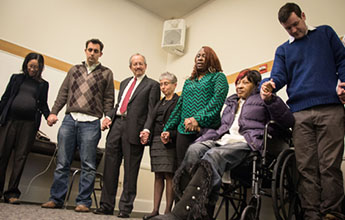
Supreme Court Decision
|
 |
Thousands of home care workers have organized over the last few years, improving their pay, benefits, working conditions, leading to a more stable work force and improved service to patients. |
The 5-4 decision in Harris v. Quinn concerns home care workers who render assistance to people in their own homes, rather than in nursing home facilities. Their wages are covered by states and subsidized through the federal Medicaid program. Thousands of home care providers in several states have organized unions over the past few years.
The case involved a group of eight home-care workers, led by Pamela Harris, who refused to join the Service Employees International Union. In 2010, Harris and the others filed a suit objecting to the fair share fees they paid after Ill. Gov. Pat Quinn granted exclusive union representation for state-funded disability-care providers to the SEIU.
The suit argued that the plaintiffs’ First Amendment rights were violated when they were forced to pay a servicing fee (agency fee) to the SEIU for negotiating and administering their contract.
Those fees cannot be used for political activity. Still, the workers claimed that the fees violated their First Amendment rights.
The majority ruled in favor of Harris and the others, ruling that even negotiating wages was a political act, up holding their First Amendment argument.
In a statement on the court’s decision, the SEIU said:
The ruling places at risk a system of consumer-directed home care in Illinois that has proven successful in raising wages, providing affordable health care benefits, and increasing training. The number of elderly Americans will increase dramatically in the coming years. States need to build a stable, qualified workforce to meet the growing need for home care--and having a strong union for home care workers is the only approach that has proven effective.
The Supreme Court’s opinion was narrowly written, holding that Illinois’ home care workers were not primarily employees of the state, but were employed by the recipients of their care. So, the decision does not overturn agency fee agreements reached by unions on behalf of police, firefighters, teachers and other public workers in the 26 states where right-to-work laws are not in effect.
However, labor law experts say the majority opinion, written by Justice Samuel Alito, laid out a clear legal rationale for such a decision down the road.
In her dissenting opinion, Justice Elena Kagan defended the current practice of charging agency fees to non-members of home care bargaining units, saying that such agreements enable the state to attract a better and more stable workforce to serve disabled patients. She wrote:
Because of [collective] bargaining, as the majority acknowledges, home-care assistants have nearly doubled their wages in less than 10 years, obtained state-funded health insurance, and benefited from better training and workplace safety measures. The State has also benefited by getting a more stable workforce providing higher quality care, thereby avoiding the costs involved with institutionalization.
The National Right to Work Foundation argued the plaintiffs’ case. They draw much of their financial support from wealthy corporations and individuals who openly oppose the right of workers to gain a voice on the job by organizing unions. In a statement on the Supreme Court’s decision, the foundation said: “Families in Illinois can relax knowing their homes are safe from being a union workplace…”
“The Right to Work Foundation’s talk about First Amendment rights for workers is a fig leaf covering their real intent: to weaken the ability of workers on the job to organize themselves for better pay, working conditions and service to their employers,” says International President Edwin D. Hill.
“Like other unions that represent members in the public sector, Harris v. Quinn will not deter us from standing up for a voice on the job for hard-working men and women. And we are confident that most members will see the need to contribute financially to their own success, not get a free ride on the backs of others by claiming their First Amendment rights are being violated. Solidarity wins. Selfishness loses in the long run,” says Hill.
![]()